In Community Supported Agriculture, customers take risk with local farmers to strengthen diversified, organic farms
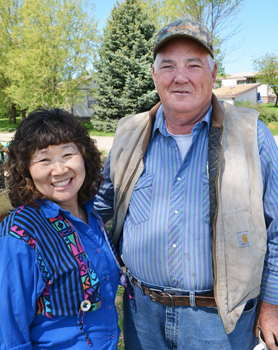 |
| Gary and So Yi Duek Angell own Rocky Ridge Ranch nine miles north of Reardan. |
Concerned that people suffer health problems and allergies because industrialized agriculture uses chemicals and transporting food reduces its nutritional level, Gary and So Yi Duek Angell feel their diversified organic garden and sustainable pasture-based livestock farm near Spokane offers a win-win option for them as farmers and for their customers.
In 1983, they bought 160 acres nine miles north of Reardan and later another 240 acres from a former homestead settled in 1887. After years of developing the buildings and farmland, they believe their farm has a future.
For five seasons—two winters and three summers—they have made Rocky Ridge Ranch a sustainable farm through Community Supported Agriculture (CSA).
With CSA, regular customers pay in advance for a share of the farm’s production, sharing the risk with the farmer. In good years, they receive more produce than in poor years. Each week, CSA customers pick up a cooler of fresh produce at the farmers’ markets.
“CSA assures us that what we grow is paid for and used,” said Gary, telling of previously bringing home produce not purchased to feed to the chickens and pigs.
“It means we have capital to plant the garden and operate at a profit,” he continued. “With the CSA, we do not have waste. It makes our small-scale food production financially possible.”
They know the people who eat the food they grow, and their customers know them.
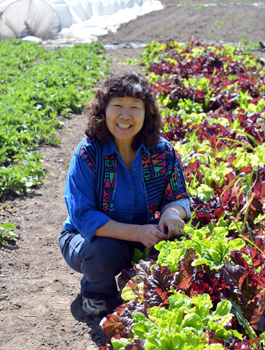 |
| So Yi Duek Angell grows 27 green. |
Gary and So have also been able to extend their growing season using plastic and fabric covered hoops and using drip irrigation. The fabric allows sun, air and water to pass through while protecting crops from humidity, pests, and cold and hot weather.
The extended season means they can offer two CSA seasons a year and be at the South Perry Thursday Winter Markets.
They plant two acres with vegetables—about 27 varieties of lettuces and greens, plus onions, garlic, squash, potatoes, corn, tomatoes and beets. Planting, tending and harvesting multiple crops is more labor intensive than single-crop farming, said Gary.
They now have about 450 free-range chickens, 24 ducks, 50 geese, 100 turkeys, 17 heifers, 30 calves and yearlings, 12 breeding hogs, numerous grower pigs, and sometimes goats or lambs to supply meat and eggs.
Gary and So first sold produce at the Spokane Public Market. They were vendors at the Spokane Farmers’ Market when it was on Second Ave. Now they go to the Millwood Farmers’ Market from 3 to 7 p.m., Wednesdays, in the parking lot of Millwood Community Presbyterian Church, and to the South Perry Farmers’ Market from 3 to 7 p.m., Thursdays, in the parking lot of The Shop.
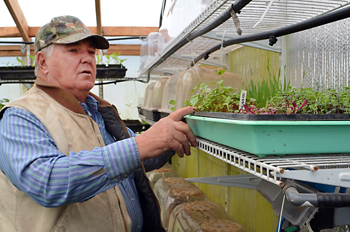 |
| Gary checks the mini veggies for Santé Restaurant in Spokane. |
Santé—French for “health”—Restaurant buys their produce, herbs and mini vegetables, and use mostly their pork, beef, eggs and some poultry. Gary appreciates its support of local agriculture.
They feel their farm has a future because one of their six grandchildren, Bryan, is learning about farming and helping do what’s needed to keep the farm running. He eventually hopes to take over responsibility for it. He helps with plumbing, wiring, digging, vet work and repairing vehicles.
In addition, this summer, Randy Sheckler from nearby Wilbur is working as a farm hand to learn about small-scale farming.
Gary and So both grew up in rural areas involved in farming—Gary in the Northwest and So in southern South Korea. They met when he was in the army there.
As a child, Gary helped his family, who were migrant workers, pick berries, beans and fruit on Northwest farms. He lived on various ranches and dairy farms where he worked as a young man and learned about farming. He spent three years in his teens on a Western Montana ranch working with horses, stacking hay, fixing fences, learning cattle ranching, and raising ducks.
At 16, he joined the army. While in the service and since he retired, he completed high school and three college degrees—in education, industrial production and business management. He earned a master’s in teaching, studying winters at Eastern Washington University.
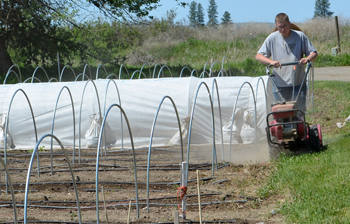 |
| Rocky Ridge Ranch extends the season with hoops. |
“I joined the army intending to stay in 20 years so I would have retirement income to supplement what I could earn farming, because I knew farming was hard,” said Gary, who visited farms and learned about farming in the places he was stationed in the United States, Europe and Asia.
In South Korea, So’s family had a big garden, growing everything they ate and more.
“In the 1950s and 1960s, we harvested in the evening. We had no refrigeration, so we set the vegetables outside overnight. It was wet. We put them in sacks we carried on our backs, in both hands and on our heads, walking 20 miles in the early morning to the market, where we bartered for fish and other things,” she said.
To go to market, school or church, So walked barefoot on dikes between the rice paddies.
She and her three brothers had no toys, shoes, running water, TV or radio, and no money to buy sugar, candy, pens or pencils. Because they lived far from a doctor, her youngest brother died of pneumonia at the age of five.
So married Gary and came to the United States 35 years ago. Her mother came 10 years later.
Learning about good land deals in Northeast Washington, Gary gave up a job in a shipyard where he worked from 1980 to 1983 after retiring from the army. The first year’s monthly payments were the down payment.
He and So had to make many improvements. They turned the horse barn into a garage, and a blacksmith shop into a cabin they used until they moved a mobile home onto the land.
The first summer, they camped on one of the rocky ridges on the land. There was no electricity, running water or inside plumbing. Gary had to re-dig the old well. Many other repairs were needed.
He built a shed and installed a water tank, generator, sink and inside toilet. He thought of using alternative electricity, but decided to pay $18,000 to bring a power line to the farm. They dug a one-mile ditch to bring the phone line in. With the power line came county responsibility to maintain the gravel road to their place.
“A farmer has to be his own municipal service department,” said Gary, “ and his own veterinarian.
“I had to develop the water wells. A 200-foot well pumps seven gallons a minute and a new 260-foot well pumps 40 to 50 gallons a minute,” he said.
The new well is especially important if they need to fight a fire, Bryan pointed out.
The 400-acres, Gary said, is a size typical of farms in the 1950s.
So grew primarily Asian garlic until the mid 1990s, when the United States began importing it, and their market declined.
Gary continues to read and study to keep up with trends in farming—most recently in free-range chicken farming.
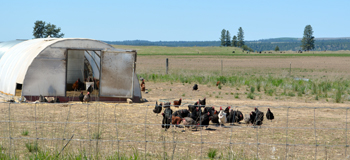 |
| Rocky Ridge chickens are "free-range." |
“Free-range” just means poultry are not kept in cages, he explained. Their chickens are both free-range and pastured. He recently shifted from using a system with chickens nesting in huts he had to move each day and heat in the winter to vaulted coops he leaves in one place, rotating the chickens so he can clean the coops. Chicken manure drops on the floor covered with hay that composts and generates heat to keep the coops warm.
“Last winter, the hens had good egg production,” he said.
Managing heifers in an economy that goes up and down and in a time of drought—average precipitation has dropped from 18 to 12 inches a year—is tricky.
Gary sold many heifers for meat last year, but prices to replace them doubled this year. Demand for grass-fed beef keeps growing. He went to classes and experimented with forage crops.
As drought decreased forage growth, he dropped to 12 cows. In 2008, he spent $8,000 to buy feed hay to supplement what he grows.
“Across the country, farmers have fewer cows than in the 1950s,” Gary said. “Today a yearling sells for $1,200, not $300.
“With the economy shifts, it’s hard to figure what to expect in sales,” he said. “Last year, there was price resistance by customers, but the cost of seed for crops doubled and feed grain tripled.
“It’s hard to keep consumer prices down,” Gary said. “People first went to farmers’ markets to buy fresh, locally grown, better-tasting organic fruits and vegetables. Local produce has more vitamins and minerals than produce grown far away and shipped to supermarkets. Now people want to buy cheaper food.”
In 2008, when sales dropped, he took courses in Community Supported Agriculture through Spokane Tilth. Rocky Ridge Ranch was the third in the area to use CSA, after Tolstoy Farm near Davenport and Elithorp Farm near Deer Park. Three others in the area also offer CSA.
Gary started with 25 CSA customers. Last year 37 bought shares. Some are still available.
“To continue to do the garden, we had to go to CSA. Table sales at the farmers’ markets were not enough,” he said.
The concept of CSAs started in Japan as industrial agriculture took over. People developed ties to a local farmer and supported the farmer by paying in advance so the farmer had the capital to plant.
Gary said it’s hard for small farms to borrow small sums from banks, but easy for large farms to borrow large amounts.
He said there is about a 50 percent turnover in his CSA customers each year as people’s lives and needs change. The CSA is not for someone who just wants carrots and lettuce, he said. Because customers receive some of all produce harvested each week, they learn to cook and eat new items.
CSA shares are enough to feed a family of four. Sometimes, two families share a share or some arrange to have a share every other week, because the produce lasts two weeks. Gary offers two 20-week CSA seasons a year, skipping January or February in the middle of the late-fall to early spring season.
Gary and So attend First Assembly of God and the Beacon Hill Korean Assembly of God in Spokane. They find their churches another avenue to educate people on health benefits of eating local organic produce and on the need to care for the environment.
One way they “teach” is by donating food for special events to give people a taste.
For information, call 953-0905, email info@rockyridgeranchspokane.com or visit rockyridgeranchspokane.com.
Copyright © June 2012 - The Fig Tree




